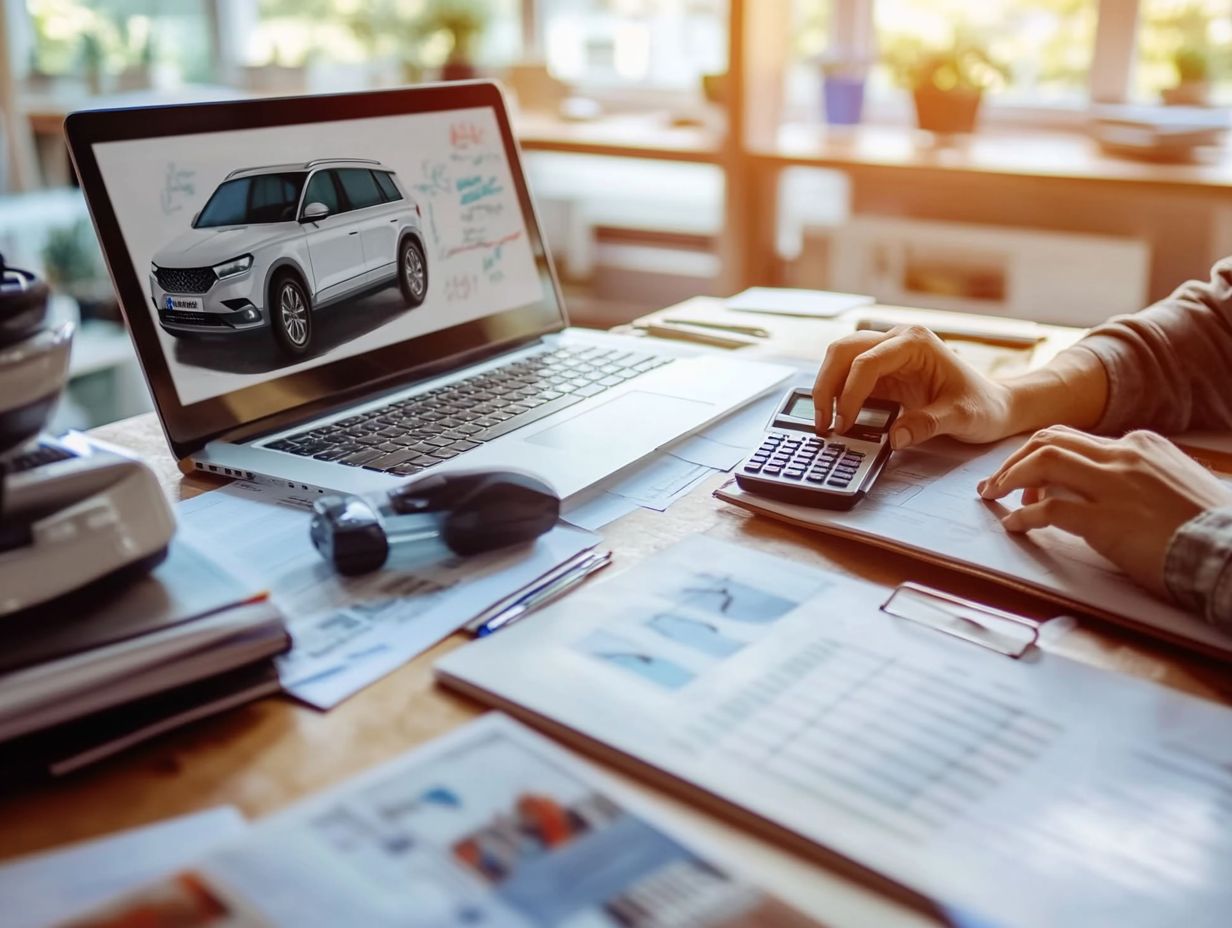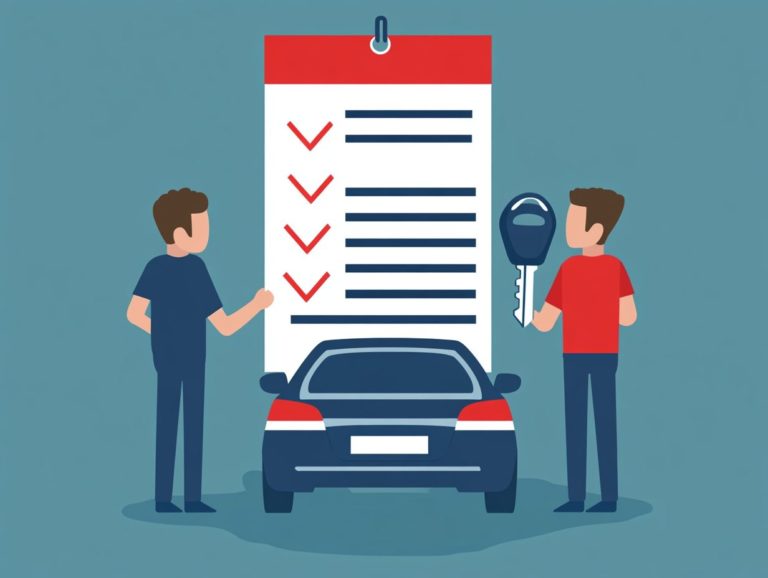Buying New Cars: Tips for Budgeting
Buying a new car marks an exhilarating milestone, yet it can quickly become overwhelming, particularly when it comes to managing your budget.
You ll need to grasp the essential factors that influence your costs and explore various financing options there’s quite a bit to consider. This guide is designed to help you establish a realistic budget, research prices effectively, and negotiate the best deal possible.
It will also delve into hidden expenses, such as insurance and maintenance, while exploring alternatives to purchasing new. By the end of this journey, you ll feel empowered to make informed decisions that align perfectly with your financial needs.
Contents
- Key Takeaways:
- Setting a Budget for a New Car
- Researching and Comparing Prices
- Financing Options
- Negotiating for the Best Deal
- Additional Costs to Consider
- Alternative Options to Buying New
- Frequently Asked Questions
- What are some essential tips for budgeting when buying a new car?
- Should I consider financing options when budgeting for a new car?
- How can I save money when buying a new car?
- What are some common mistakes to avoid when budgeting for a new car?
- Can I trade in my current car to help with budgeting for a new one?
- Are there any additional tips for budgeting when buying a new car?
Key Takeaways:

- Create a realistic budget by considering factors like monthly payments, insurance, and maintenance costs.
- Use online resources to research and compare prices of different car models to find the best deal.
- When negotiating for a new car, come prepared with knowledge of the market value and be willing to walk away if the deal is not right.
Setting a Budget for a New Car
Establishing a budget for a new car is an important financial choice that demands thoughtful planning and a clear grasp of your financial aspirations. To effectively prepare, it’s beneficial to understand how to prepare for a car purchase budget.
By identifying a realistic price range informed by your monthly income and savings, you position yourself to make smart choices that will spare you from future financial strain.
A meticulously crafted budget takes into account not only the total purchase price but also the down payment and the ongoing ownership costs tied to your new vehicle, as detailed in the essentials of setting a car financing budget.
Factors to Consider
When you’re setting a budget for purchasing a car, you need to consider several factors to avoid hidden costs and ensure you’re making a sound financial decision. For first-time buyers, following tips for first-time new car buyers can be incredibly helpful.
Beyond just the initial purchase price, it s essential to look at the total cost of ownership, which includes various ongoing expenses. One of the big players here is depreciation the decrease in value over time which can significantly impact your resale opportunities.
Then there s maintenance. Those routine oil changes and unexpected repairs can add up quickly if you don t plan for them in advance.
You also need to factor in insurance premiums, which can vary widely depending on the car’s make and model, as well as registration fees that differ from state to state. For a detailed understanding of these costs, consider reviewing this comprehensive overview of buying a new car. Examine these elements closely to develop a more accurate budget that reflects not just the upfront costs but the entire financial commitment required for your vehicle’s lifespan.
Researching and Comparing Prices
Researching and comparing prices is an essential step in your car buying journey, whether you’re eyeing a brand-new model or a reliable used vehicle from a dealership or private seller. Utilizing negotiating tips for buying a new car can also enhance your experience and help you secure the best deal.
This step helps you make smart choices and ensures you get the best value for your investment.
Using Online Resources
Utilizing online resources can offer you invaluable insights into vehicle financing options and price comparisons, elevating your buying experience to a whole new level.
Platforms like Edmunds and Kelley Blue Book grant you access to detailed pricing information and allow you to compare interest rates from various lenders. These powerful tools equip you to identify the best financing offers and negotiate with confidence, ensuring you never overpay.
Websites such as Cars.com and Autotrader further enhance your experience by enabling you to filter search results based on your budget, preferences, and local dealer inventories, streamlining your decision-making process.
By tapping into these resources, you can approach your purchase with greater confidence and make decisions that truly align with your financial goals.
Financing Options

Know the financing options available to you when buying a car. Whether it’s an auto loan or other methods, this knowledge helps you make a smart choice.
Understanding the different financing options at your disposal is crucial for making an informed decision when it comes to purchasing a vehicle.
This knowledge enables you to navigate your choices effectively and select the option that best aligns with your financial goals.
Pros and Cons of Different Payment Methods
When considering vehicle financing, you must carefully evaluate the pros and cons of various payment methods to ensure your financial success. This involves exploring options such as leasing versus buying a vehicle. Each choice distinctly impacts your immediate cash flow and long-term financial outcomes.
Leasing often comes with lower monthly payments and grants you access to newer models frequently. This option is perfect if you value the latest technology.
However, be mindful of mileage restrictions and the fact that leasing doesn t contribute to ownership, which could influence your net worth over time.
Buying a vehicle may initially strain your finances. However, it builds ownership value and can improve your credit score if managed wisely. This strategy can lead to greater financial stability in the long run, making it a compelling option for those who think ahead.
Negotiating for the Best Deal
Negotiating for the best deal is an essential step in the car-buying journey, enabling you to secure a purchase price that aligns with both your budget and financial aspirations. Understanding how to finance your first new car can also help you make informed decisions during this process.
Tips for Successful Negotiations
Successful negotiations hinge on good planning and a keen understanding of deal-making strategies that can truly empower you at the dealership.
Equipping yourself with effective tactics can dramatically enhance your ability to secure a favorable deal. Knowing when to walk away is a powerful leverage point; it demonstrates your seriousness and openness to other options.
If you encounter a price that stretches beyond your budget, presenting a well-researched counteroffer can certainly capture the seller’s attention. Prioritize building rapport with the salesperson; positive interactions often lead to increased flexibility in negotiations.
Being prepared and confident will elevate the negotiating process and pave the way for a more rewarding outcome.
Additional Costs to Consider
Don’t forget to consider additional costs that can greatly impact your wallet when acquiring a vehicle.
Insurance, Maintenance, and Other Expenses

Insurance, vehicle maintenance, and various other expenses are essential elements that contribute to the overall cost of car ownership.
As a car owner, it’s crucial to recognize the significant impact these factors have, not just on the longevity of your vehicle, but also on its resale value.
When estimating your insurance costs, consider your driving history, the make and model of your vehicle, and the coverage options that align with your lifestyle.
Maintenance expenses can also vary significantly depending on your driving habits and your vehicle’s specific needs. For instance, a luxury car may require more frequent and costly maintenance than a dependable sedan.
By proactively budgeting for these costs, you can avoid unexpected financial strains and be well-prepared for repairs and insurance premiums. This thoughtful approach ultimately paves the way for a more rewarding ownership experience.
Alternative Options to Buying New
Exploring alternative options to buying new cars, like leasing or purchasing used vehicles, can offer you substantial financial benefits. Additionally, considering tips for efficient car maintenance budgeting can save you a bundle right away and help you avoid the steep depreciation that comes with new cars.
By considering these alternatives, you position yourself for smarter financial decisions while still enjoying the vehicle that meets your needs.
Leasing, Used Cars, and Other Alternatives
Leasing and buying used cars are excellent options that can ease your financial concerns while fulfilling your personal needs.
Each choice has its own money effects, influencing your monthly payments and overall cost of ownership significantly. When you consider leasing, you might find lower down payments and reduced monthly fees, making it easier to fit into your budget. However, keep in mind the mileage restrictions and potential end-of-lease charges that could affect overall affordability.
Buying a used car gives you ownership, offering you the freedom of unlimited mileage and no lease-term penalties. While the initial costs may be higher, you ll benefit from building value in your car over time, which can sway your financial commitment in ways that deserve thoughtful consideration.
Frequently Asked Questions
What are some essential tips for budgeting when buying a new car?
- Set a realistic budget: Determine how much you can afford and stick to that budget.
- Research the market: Compare different car models, prices, features, and financing options to find the best value.
- Consider all costs: Include additional costs like insurance, maintenance, and fuel in your budget.
Should I consider financing options when budgeting for a new car?

Yes, financing can help if you don’t have the full amount to purchase a new car upfront. To make an informed decision, learn how to finance a new car purchase and compare interest rates and terms to find the most affordable option for your budget.
How can I save money when buying a new car?
- Negotiate the price: Don t hesitate to negotiate with the dealership for a better deal.
- Choose a fuel-efficient car: A car with good gas mileage will save you money on fuel costs in the long run.
- Consider buying a slightly used car: This can save you money while still getting a reliable vehicle.
What are some common mistakes to avoid when budgeting for a new car?
- Not considering all costs: Be sure to include all expenses, not just the car’s initial price.
- Not doing enough research: Failing to research can result in overspending on a vehicle.
- Not sticking to your budget: Stay disciplined to avoid overspending, even when excitement kicks in.
Can I trade in my current car to help with budgeting for a new one?
Yes, trading in your current car can help lower the cost of a new one. Do research on your car’s value and negotiate a fair trade-in price with the dealership.
Are there any additional tips for budgeting when buying a new car?
- Don’t rush into a decision: Take your time to think through your options and make a well-informed choice.
- Consider the long-term costs: Look beyond the initial purchase price to include maintenance and repairs.
- Get a second opinion: Bring a family member or friend car shopping to ensure you’re making the best decision for your budget.
Start planning your budget today for your dream car!






